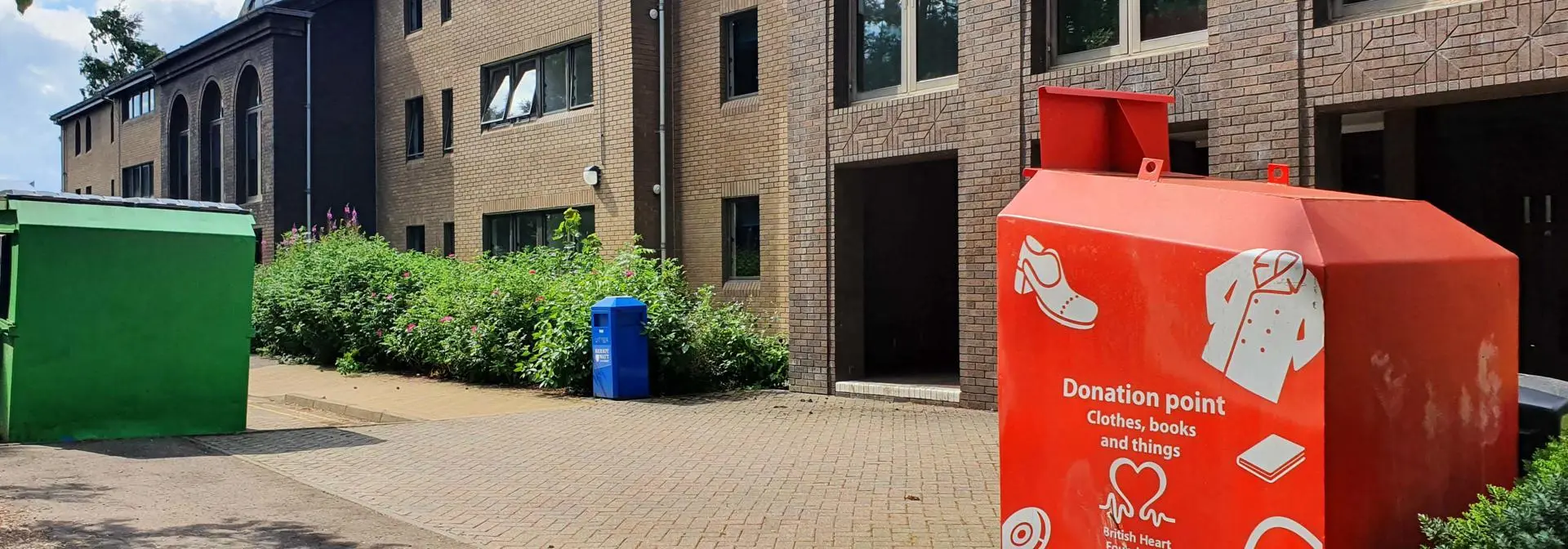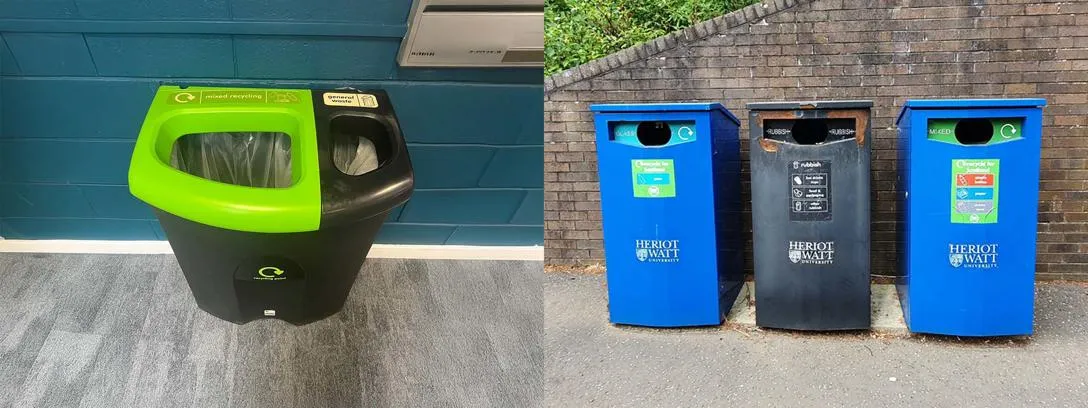Recycling

Guidance on waste and recycling
Understanding what you can and can’t recycle on campus goes a long way toward helping Heriot-Watt University be more sustainable. Recycling can seem a complex topic, but there are a few rules of thumb that you can follow to get it right.
Bins
Look out for recycling bins and rubbish bins on campus. Indoors, we mostly have the double-sided bins with a green opening for dry mixed recycling, and a black opening for general waste. Outdoors, we have triple blue metal bins for glass, dry mixed recycling, and general waste.

What goes in the dry mixed recycling?
Robust materials which are made from one component, like cardboard, plastic bottles/boxes, and cans. They must be clean and dry.
What goes in the glass bin?
Glass only please – no non-glass lids, bags etc.
What goes in the food waste bin?
If you have a food waste bin where you work or stay, please ensure that only food scraps go into the bin. No packaging, paper or ‘compostable’ coffee cups – these are only able to be composted industrially and are not suitable for the food waste bin.
What goes in the general waste?
General waste is for rubbish that can’t be recycled, like packaging made of multiple materials, e.g. a plastic-lined paper bag or a crisp packet.
Soft materials, like plastic film, carrier bags, paper tissues and snack bar wrappers.
Dirty things, e.g. a pizza box which has absorbed oil (rip the clean bits off and recycle them!)
Why can’t I recycle these things?
Items made of multiple materials: Normal recycling facilities can’t process these as they need to be separated down into their constituent parts to be recycled. This is generally more resource-intensive than incinerating them.
Soft materials: such as cling film, can damage the recycling plant machinery.
Dirty items: residue can absorb into cardboard and paper in the recycling bin, and ruin them to the point where they can no longer be recycled. Also, dirt can damage recycling machines.
Our recycling carrier can separate out some non-recyclables if a small amount do make their way into the recycling bin. However, if they find our recycling bins to be too contaminated then they process the whole thing as general waste. This is not very sustainable and it wastes everyone’s efforts to recycle!
The goal is to avoid contamination of the recycling with non-recyclable waste and – the particularly ruinous - food scraps and liquids.
What if I’m not sure?
Another way to be sure about what you are recycling is to check on the packaging, if it is printed with labels, for these clues:

Widely recycled
Over 75% of the UK recycles this - likely recycled in Edinburgh.
Not yet recycled
Put this in the general waste.
Check locally
This probably can be recycled, but not in the normal dry mixed recycling. Hang onto it, put it in the general waste but don’t contaminate the recycling bin!
Mobius Loop
The Mobius Loop – this generally means the product can be recycled, but if unsure check locally!
Green Dot
This does not mean that a product is recyclable, so look for another label. This symbol means that the manufacturer has made a financial contribution toward recycling of the material in Europe.
If - even after you have read this guidance diligently - you’re unsure if something is recyclable or not, put it in the general waste.
Keep liquids and waste out of the recycling bins by cleaning your recyclables where possible, and placing them in the black bin when it is not possible.
How can I be even better?
Avoid waste by bringing your own (clean!) coffee cup, cutlery, and containers to work.
Outdoor recycling and general waste disposal locations
Bin locations can be found on this map, created by Heriot-Watt University’s Eco Society.
What happens to our waste?
General waste – the majority of our general (black bin) waste goes to Millerhill Energy from Waste centre I the east of Edinburgh. Essentially, it gets incinerated and the resulting heat produces steam which drives a turbine which produces electricity. The gases produced during combustion are cleaned to remove pollutants. Of course, combustion produces emissions – 250-600 kg CO2/tonne of waste processed. Learn more about generating energy from waste.
Dry Mixed Recycling and Glass - These are sorted at Biffa’s sorting plant at Broxburn and sold to different re-processors. Plastics are recycled by Biffa Polymers; aluminium cans are recycled by Novelis who operate the UK’s only can recycling plant in Warrington; paper and card are sold to a range of companies and steel cans sold to scrap metal dealers.
Food waste – this goes to the Biogen plant at Millerhill. Read more about anaerobic digestion.
For more info on how other types of waste are recycled, see Biffa’s website.
Let’s look at some common materials. Can I recycle…
Pizza boxes?
Recycle – green bin
But: tear off greasy and sauce-covered parts and put in the general waste – greasy cardboard hs been chemically altered and cannot be recycled.
Yoghurt pots?
Recycle – Green Bin
But: Rinse clean!
Coffee cups?
General Waste – black bin!
Why? Most of our coffee cups are made from Vegware, an organic material which is commercially compostable. We do not yet have a process in place for collecting Vegware, so it is best to put it in the general waste bin as it cannot be recycled. Other types of coffee cup are made from plastic-lined paper which cannot be processed by normal recycling centres.
Tissues?
General waste – black bin
Why? These are soft and can clog the sorting machines at the recycling centre.
Paper plates and food containers from the canteen?
General waste – black bin
Why? These generally have food residue on them, and are generally plastic-coated.
Disposable cutlery?
General waste – black bin
Why? This may look like plastic, but it is PLA – a organic compound which needs to be commercially composted. It can’t be recycled with plastics as it is a different composition to plastic.
Food waste?
If your office, halls or area has food waste bins you should put food scraps, teabags, coffee grounds etc. in there. Just remove from any wrapping and packaging and ensure that the bins are emptied regularly.
Glass?
Glass can be recycled, in a separate bin. Glass bins are located around campus, for example by the lawn and in some student halls and buildings. Glass only, please – if you are using a bag to carry your glass waste, please dispose of this elsewhere or re-use it, along with the lids from your glass bottles.
Do you mean compostable cups too?!
Yes, we mean those cups too. They are a step in the right direction, but they still require a dedicated cup collection point, which we do not yet have, and are not suitable for the 'mixed recycling' bins.
Cupkind - certified recyclable and compostable cups - now provided at The Student Union
Specialist household waste
Batteries
There is a battery box in the Mary Burton building.
Clothing
Clothing which is still wearable can go in the British Heart Foundation donation bins located around campus. If it has fully worn out and cannot be worn, you have a few options before binning it. Can you re-purpose it as dish cloths or rags?
Many textiles in our modern clothing are blended materials and therefore difficult to separate and recycle. It is a conundrum to know what to do from a sustainability perspective. Clothing made from natural materials such as cotton is good because it does not give off microplastics when washed; plastic clothing is OK because it is durable; however all contribute to waste eventually. Buying less, buying things to last, and buying second-hand all really help.
Other specialist household waste
Biffa have an extensive list of how to recycle common household items on their website.
Specialist Commercial Waste
Having a clear-out; got materials which are no longer of use or equipment which is coming up to the end of its life? Think before you skip! Contact Robbie Fraser in Estates to coordinate this.
Recycling points
Edinburgh Campus
We have established a number of recycling points across the Edinburgh Campus where you can dispose of your drinks cans, bottles, paper and general waste.
You will find recycling facilities within the student residences' refuse rooms.
Scottish Borders Campus
There are recycling bins in every classroom - one for general waste and one for recyclables (paper, card and plastics).
There are larger recycling bins in all public areas - the Union, shop and main reception.
There are also specialist recycling points for batteries at reception, large paper bins within the textile workshops, a wood, rubble and metals skip outside the construction workshops, oil and tyre recycling within motor vehicle and a bottle bank in the main public car park.
There are also recycling points at the Jean Muir Student Village.
Orkney Campus
There is a recycling point at the Orkney Campus in the kitchen area where you can dispose of your drinks cans, plastic bottles, glass bottles and batteries. There are paper recycling points and general waste bins across the campus. Special uplifts for other materials that can be recycled/reused can be arranged through Orkney ZeroWaste.
Malaysia Campus
Please ensure that any waste is disposed of in the correct waste recycling receptacle provided. Waste bins are located at strategic locations around the campus.